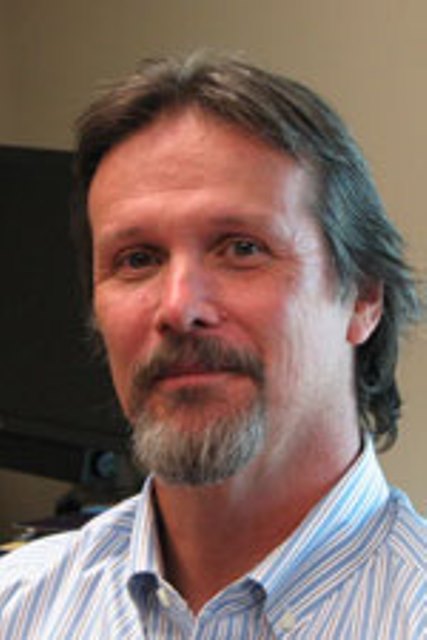Environmental Science Hosts Second Annual Seminar Series

George Cobb courtesy photo.
Follow us on Twitter: @BaylorUMedia
Media contact: Tonya B Lewis, (254) 710-4656
WACO, Texas (Sept. 5, 2014) – Baylor University’s Environmental Science Department kicked off the fall semester with its second annual seminar series, which began on Aug. 26 and will end on Dec.2. From airborne steroids to marine ecosystems, the 15-week series offers a full spectrum of topics presented by a variety of esteemed guest speakers from around the nation.
Assembled for the first time last year, the seminar series is the brainchild of George P. Cobb, Ph.D., chair of the Environmental Science Department in the College of Arts & Sciences.
“The seminar series lets all of us know what types of research and policy decisions are underway currently and for students especially it lets them get a glimpse of the breadth and depth of activities that are occurring outside of Baylor,” Cobb said. “These speakers are the best at what they do.”
The diversity in the speakers’ affiliations offers students perspective stemming from other universities, federal agencies, natural resource management and nongovernmental agencies. On Sept. 23, Kevin Reynolds, U.S. Department of Interior Case Manager, will talk about his involvement as the lead scientist for the federal natural resource damage assessment in the Deep Water Horizon court case, otherwise known as the BP oil spill.
Though most speakers are hosted by Cobb, students within the department are given the opportunity to invite and host a speaker of their choice. With an assigned budget, the students are responsible for contacting, managing travel arrangements and hosting their guest speaker.
Cobb says the department plans on continuing the seminar series every year and hopes to include it each semester.
The seminars will take place on Tuesday’s at 2 p.m. in the Baylor Science Building room A.207:
• Aug. 26- Internal Speaker , TBD
• Sept. 2- George Cobb, “Airborne Steroids”
• Sept. 9- Mary Reilley, U.S. EPA Office of Water, “From Science to Policy to Results: evolution of Science Based Policy for Water Quality Protection”
• Sept. 16- Dr. Sasha Madronich, National Center for Atmospheric Research, “Advances in Air Quality Assessments”
• Sept. 23- Kevin Reynolds, DOI Case Manager, “Deep Water Horizon”
• Sept. 30- Dr. Sherine Obare, Western Michigan University, “Nanomaterial Behavior”
• Oct. 7- Dr. John Bickham, Battelle Memorial Institute, “Conservation genetics of Stellar sea lions and bowhead whales”
• Oct.14- Dr. Diane Nacci, U.S. EPA Atlantic Ecology Division, “Sediment Estuarine Toxicology”
• Oct. 21- Dr. Pamela Plotkin, TAMU, “NOAA Sea Grant Activities”
• Oct. 28- Laura Huffman, Nature Conservancy, “Nature: Our Biggest Asset”
• Nov. 18- Dr. Claudia Czimczik, University of California, Irvine, “Carbon Cycling & Climate Change”
• Dec. 2- Dr. Larry McKinney, Harte Research Institute for Gulf of Mexico Studies, “Marine Ecosystems & Research”
by Sarah Czerwinski, student newswriter, (254) 710-6805
ABOUT BAYLOR UNIVERSITY
Baylor University is a private Christian university and a nationally ranked research institution, characterized as having “high research activity” by the Carnegie Foundation for the Advancement of Teaching. The university provides a vibrant campus community for approximately 15,000 students by blending interdisciplinary research with an international reputation for educational excellence and a faculty commitment to teaching and scholarship. Chartered in 1845 by the Republic of Texas through the efforts of Baptist pioneers, Baylor is the oldest continually operating university in Texas. Located in Waco, Baylor welcomes students from all 50 states and more than 80 countries to study a broad range of degrees among its 11 nationally recognized academic divisions. Baylor sponsors 19 varsity athletic teams and is a founding member of the Big 12 Conference.
ABOUT BAYLOR COLLEGE OF ARTS & SCIENCES
The College of Arts & Sciences is Baylor University’s oldest and largest academic division, consisting of 24 academic departments and 13 academic centers and institutes. The more than 5,000 courses taught in the College span topics from art and theatre to religion, philosophy, sociology and the natural sciences. Faculty conduct research around the world, and research on the undergraduate and graduate level is prevalent throughout all disciplines. Visit www.baylor.edu/artsandsciences.